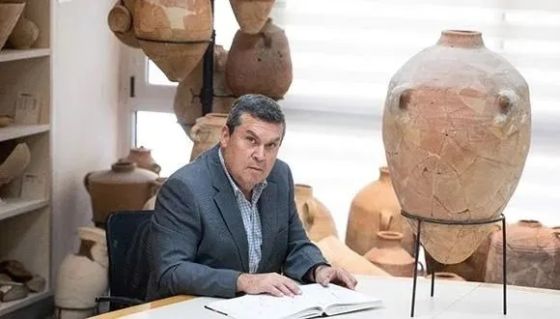
Prof. Oded Lipschits Awarded the 2022 EMET Prize in Archaeology
The annual prize is considered the “Israeli Nobel Prize”.
Prof. Oded Lipschits, head of The Sonia & Marco Nadler Institute of Archaeology at The Lester and Sally Entin Faculty of Humanities at Tel Aviv University was announced as a recipient of the 2022 EMET Prize (for art, science and culture). He will be awarded the prize in June this year, in the presence of the Prime Minister of Israel.
The Researcher of the Great Empires
Prof. Lipschits was born in Jerusalem, a city which is very central to his research pursuits. He has served for more than a decade as Head of the Institute of Archaeology at Tel Aviv University, is the Austria Chair of the Archeology of the Land of Israel in the Biblical Period and Founder and Director of Ancient Israel Studies for MA and doctoral students.
He has been directing the excavation delegation at Tel Azka since 2010, and since 2018 he has also been heading the excavations at the temple which was discovered at Tel Motza and which dates back to the biblical period.
Prof. Lipschits’ works focus on the “Age of Empires” – the period of the rule of Assyria, Egypt, Babylon and Persia – and its far-reaching effects on the southern Levant in general, and Judea in particular. One of the great contributions of Prof. Lipschits was the recognition that contrary to the accepted chronological conception, the archaeology and history of the Levant in most of the first millennium BCE were shaped by the presence and rule of the great empires.
Through a series of books and articles he has illuminated how the destruction of Jerusalem and the First Temple did not lead to a period of complete exile of the land (“the myth of the empty land”), and that the period of “Return to Zion” is also largely a reflection of “the myth of mass return”.
“Striving for Excellence in the Archaeological and Historical Research of the Land of Israel”
In addition to his many publications, which became important cornerstones for the study of this period, another “building block” laid by Prof. Lipschits is an innovative study of Judean traditions within administration and economy, and especially when it concerns imprints on the handles of jars, a practice which was introduced in the late eighth century and continued into the middle of the second century BCE, during the entire period of the rule of the empires in Judea. These studies demonstrate the continuity of the administration and economy in Judea during the days of the First and Second Temples, before and after the destruction of Jerusalem, during the 600 years between the reign of Ahaz and Hezekiah until the establishment of the Hasmonean dynasty.
“This is a great honor for me personally, and of course for all of us in the Department and Institute of Archaeology, at the Faculty of Humanities and Tel Aviv University, my academic home since the beginning of my studies,” said Prof. Oded Lipschits.
“This is an important and significant award for striving for excellence in the archaeological and historical research of the Land of Israel, and for many years of hard work and fruitful cooperation with friends and colleagues here at TAU and at other universities and Israel and around the world. I would like to thank the award committee for choosing me, and of course my friends and colleagues, my wife Yael and our four children, for the love and support throughout the years that I’ve been engaged in excavations, research and writing.”
